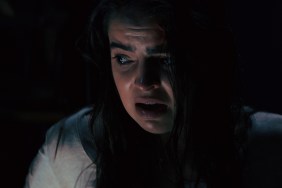
During this past summer’s Fantasia Fest we got the chance to pick up a copy of Spectacular Optical‘s new book “Lost Girls: The Phantasmagorical Cinema of Jean Rollin.” Edited by Samm Deighan, the Jean Rollin book celebrates the work of the French genre filmmaker in sixteen insightful essays all written by women. Since female characters (and the female form) play a central part in Rollin’s dreamy, sensual movies like The Iron Rose and Fascination, it seems only fitting that we get such a thorough examination of Rollin’s cinema through a female lens.
We had the chance to do an exclusive 1:1 interview with editor Samm Deighan of Diabolique magazine and co-host of the Daughters of Darkness podcast about the new book, which comes just before a special screening of The Shiver of the Vampires at the Brooklyn Horror Fest on October 14 that she will introduce. She also penned essays in the book about female vampires and female intimacy in Rollin’s work, and a third essay about his pornographic work.
Click here to purchase your copy of the book Lost Girls: The Phantasmagorical Cinema of Jean Rollin!

ComingSoon.net: What was the impetus for creating this book?
Samm Deighan: It was actually born from a casual and kind of random online conversation, when another writer suggested it. I’m a sucker for book ideas and wish I could devote every hour of the day to them, but it was nice there was so much enthusiasm for this right away from the other contributors and from Kier-La Janisse as the publisher. That allowed it to go from just an idea to an almost complete manuscript in about a year, which is wonderful.
CS: Why was it important that all the writers be female?
Deighan: I think for two reasons. First, because female genre writers are still very much in the minority. There are a lot of exciting, important voices out there, but it seemed a worthwhile project to bring more women to the forefront — which is definitely the individual aim of a lot of the book’s contributors. I know as a publishing company, Spectacular Optical is run by a woman and includes a lot of women writers in their anthologies. And the same is true of Diabolique magazine — I’m an editor/writer there along with a number of the book’s other contributors, and we have an overwhelmingly female staff. Second, a discussion of Rollin’s work, in particular, seemed well-suited to this kind of project because he has such a special relationship with female characters. They’re really front and center in all of his films in such a unique way for cult/genre cinema, though I think in the past he’s gotten an unsavory reputation because his use of sexuality is misinterpreted or written off as mere exploitation. It seemed time to right that wrong.
CS: Obviously sex and nudity plays a big part in Rollin’s films. What makes his portrayal of sexuality transcend the “male gaze”-ness that other filmmakers, even mainstream ones, often harness?
Deighan: I think what sets Rollin apart is that he gives women so much agency — sex and nudity in his films is not solely about male pleasure, it’s often moreso about female power. I think that’s unusual within genre cinema though it’s one of the constant themes throughout Rollin’s films from the beginning to the end of his career, and even including the pornographic films. That’s definitely a subject that a lot of the writers in the book explore to varying degrees.

CS: Which film of Rollin’s means the most to you?
Deighan: My default answer here is usually Living Dead Girl, because it was the first film of his that I had the pleasure to see and one of the first I saw as a teenager that had female characters like that. It had been advertised to me as sort of a dreamy zombie film, but it’s so much more than that and goes out of its way to have this really impacting, emotional story. Though there is a ton of nudity and gore in the film, its heart is really this deep connection between the two female protagonists. It’s a horror movie, sure, but also a fairy tale and a love story.
CS: The pace, lighting and low budget look of many of his films can be a turnoff for many, as is similar with Jess Franco. How did you move beyond those cosmetic issues?
Deighan: I’m not sure I can really answer this question, because I’ve been a passionate fan of both Rollin and Franco’s films for much of my life by this point. I think if you are obsessed by these kinds of stylistic choices and budgetary constraints and they are such an obstacle to you that you’re prevented from enjoying certain films or certain directors, probably most of European genre and cult cinema is not going to be for you.

CS: Of all the pieces in the book (besides yours, of course) which surprised you, even though you were already a devotee of Rollins work?
Deighan: I have no idea to answer this one, because so much love and work went into all these essays and I was surprised by every one of them. On one hand, you have more established writers taking a new look at some of his more established films (like the different essays that discuss “La rose de fer” (The Iron Rose) or Kat Ellinger’s highly literary analysis of Fascination) which I think is so important, but I’m equally excited about the essays that explore Rollin’s films that barely anyone ever writes about or discusses, like Rebecca Booth on Rollin’s final three films or Gianna D’Emilio on something like Sidewalks of Bangkok that everyone patently ignores.
CS: Ultimately, what did you realize about his films that you didn’t realize before you created “Lost Girls?”
Deighan: This might sound ironic, but I don’t think I realized just how central women were to Rollin’s films. Writing about a film is always a really immersive experience for me and I think I’d be hard pressed to write a long essay, as I did in “Lost Girls,” on any film (or director, in more general terms) without coming to love it. So I could have given you a list of the female characters and discussed the themes of women’s sexuality and so on, but it wasn’t till I wrote my chapter on female friendship in his films that I saw how it connected back to art and literature and just how pervasive it was throughout his entire canon. How he deals with girls vs women, how women function as antagonists a lot of times, and so on. How he takes certain tropes like the damsel in distress or the final girl, and utterly subverts or reimagines them.

CS: Can you talk a bit about the board game that was created as a component of the book?
Deighan: For better or for worse, crowd-funding has become an important part of creating art for a lot of people and for a book like “Lost Girls” to be able to go to print in such a gorgeous layout with so many large, full color images, we needed appetizing extras for the campaign. I think this has become one of Spectacular Optical’s specialties, and they’ve come out with some really cool stuff for all their book campaigns so far — and I know how biased I am, but this game is my favorite of all the things they’ve offered throughout all their campaigns so far. The game is basically a whodunnit like “Clue” (which I personally am obsessed with), but set within Rollin’s universe: making use of his favorite characters and sets. Basically a dream board game for anyone who loves Eurocult cinema.
CS: If you could choose one of the dozens of movies he made as a kind of “gateway drug” to his work for the uninitiated, which would you pick to show?
Deighan: I think I’ve given a different answer to this question every time I’ve been asked, but lately I have Shiver of the Vampires on the brain, because I’m introducing it in a few weeks as part of the Brooklyn Horror Film Festival, where we’re doing a NYC launch of the book. I think that one is a great way to pop your Rollin cherry. In addition to it featuring a sort of side plot about virginity loss and a bride delaying her wedding night, it includes his stereotypical theme, vampires, and is set in a gorgeous castle, but also has some wonderfully surrealistic elements and turns a lot of those staid genre tropes on their heads.
The Brooklyn Horror Fest screening of The Shiver of the Vampires will take place on Saturday, October 14.









